Herzog Caribbean Gives Paradise an Asphalt Upgrade
BY Larry Trojak
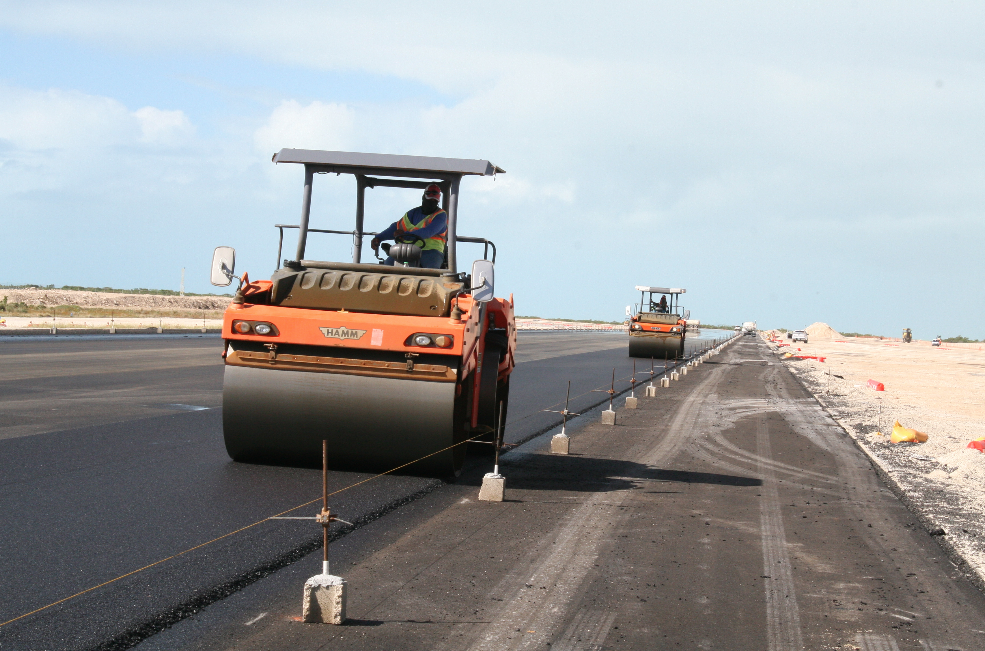
Under normal circumstances, asphalt production is a reliable, relatively constant process. What few interruptions or mechanical “events” might occur, can usually be dealt with in a timely manner, getting a plant back online with minimal impact. Take that same process and place it in the British West Indies, however, and consistency is vital. Sub-par plant performance or lack of available replacement parts can extend halted production due to the remote location.
With that—and other considerations—in mind, Herzog Caribbean recently took delivery of a new asphalt plant to supply material for a runway overhaul on South Caicos Island. As of press time, the ADM EX120 had output nearly 10,000 tons of material without a moment’s downtime, and the project was proceeding on pace for a scheduled early 2017 completion.
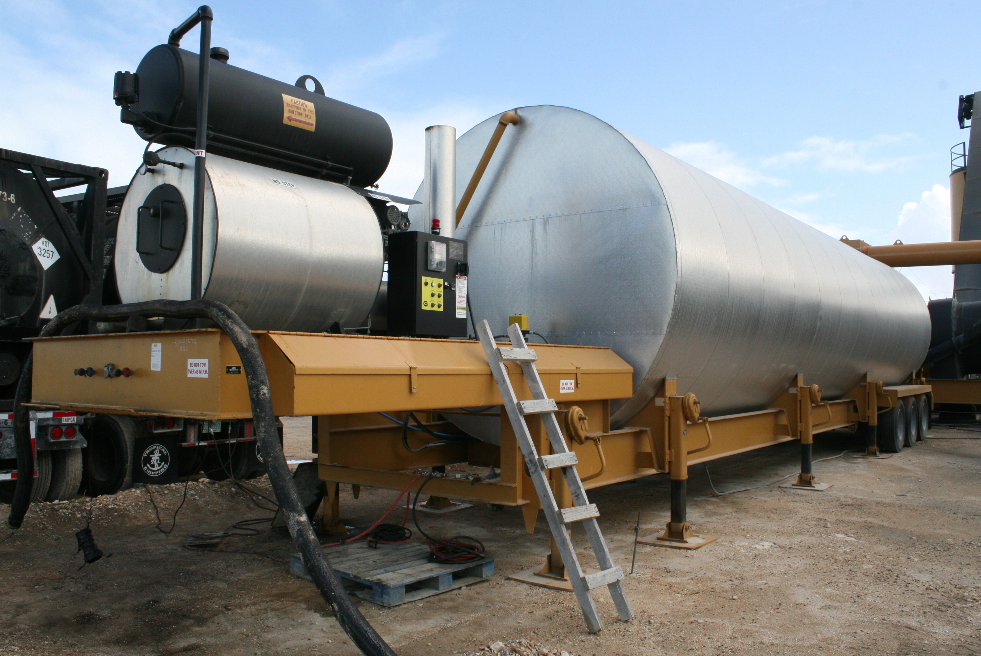
Michael Eddy explained that the delivery of liquid AC to the tropical paradise culminates in them receiving a cool product. This means they use heaters to boost the temperature before transferring it to the larger, permanent storage tank.
Generally Speaking
A division of Herzog Contracting based in Missouri, Herzog Caribbean LLC operates out of Providenciales, the capital city of Turks & Caicos, B.W.I. While most of its work is in the Turks & Caicos chain, as the name implies, the company has done projects elsewhere in the Caribbean, according to Michael Eddy, Herzog Caribbean’s vice president.
“In addition to work throughout Caicos, we’ve also done projects in the Bahamas, St. Lucia, Jamaica and Tortola,” he said. “Unlike our counterparts in the states who do primarily railroad and highway-heavy, we are more of a general contractor out here. We don’t do any vertical construction at all. Even the new airport tower at South Caicos is being built by another firm. But we’ve laid down a lot of asphalt throughout the region and the South Caicos airport job is the latest example of that.”
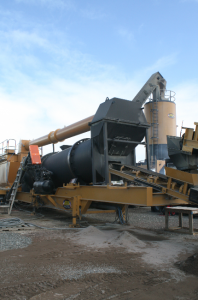
The technology virtually eliminates hydrocarbon. To further minimize environmental impact in the beautiful Caribbean, residual gases are reintroduced to the drum’s combustion zone.
The project to which Eddy refers is a total replacement of the runway, taxiways and apron at the South Caicos International Airport. Being completed in three phases, the project is sorely needed to meet both immediate needs and, because of the island’s natural beauty, those of anticipated future growth.
“This is a small island with only 900 residents, but developers are optimistic about its appeal as a tourist destination,” Eddy said. “One resort is already fully operational and another major development is nearing completion. Aside from a ferry which runs once a week, daily small-airline flights are the only way onto South Caicos, and the airport runway has been long overdue for some major repair, if not outright replacement.”
When the move was made to replace Runway 11/29, Eddy, continued, it was also decided that it should be upgraded in anticipation of larger aircraft landing there at some point. “When complete, the new 6,500-foot runway will be capable of handling planes up to the Embraer 175—but with structural modifications it could easily handle a Boeing 737.”
Get Ready for Takeoff with Herzog Caribbean
After completion of a project in St. Lucia, Herzog Caribbean was approached about selling its 150-TPH ADM asphalt plant they’d been using for a project there. With a permanent plant in nearby Providenciales (generally referred to as Provo) and no immediate needs for a mobile plant facing them, they sold it. As luck would have it, four months later they were awarded the bid for the South Caicos airport project and were suddenly in the market for a new plant.
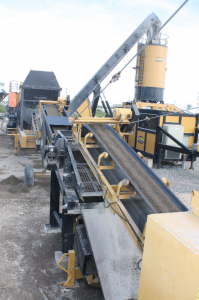
Herzog Caribbean runs aggregate sizes of 5/8-minus, 3/8-minus and a sand product. Plant Operator Simon Vasquez told the team they’re getting a consistent 110 TPH out of the plant. All photos courtesy Larry Trojak.
Eddy took a trip to Indiana. “A visit to ADM’s plant in Indiana, seeing what went into the manufacturing process and getting a chance to talk to the guys on the line who actually build the plants, helped me decide to stay with them.”
Herzog Caribbean also chose to stay with a smaller output, mobile plant, a 120-TPH counter-flow EX Series system. Though the plant is typically designed for optimal transport, Eddy and Herzog made some modifications to the standard configuration to better suit their needs.
“The most noticeable change we made was adding a standalone control room rather than the economy control cab that comes standard,” he said. “We gave up a little bit of the compactness, but felt that, in the long run, we would benefit. The salt air out here is tough on equipment in general but extremely corrosive on electrical contacts. So we had all the electrical switch gear installed in the control room van to eliminate that issue.”
He added that they also chose to bypass one additional facet of the typical compact plant’s design, one which replaces the silo with a small slat conveyor feeding a five-ton hopper. “Instead, we opted for a 50-ton capacity silo which, combined with the standalone control room, adds one trailer load when packed—we are okay with that.”
Compact design notwithstanding, Herzog Caribbean’s EX120 plant still offers most of the features of its larger counterparts. That includes ADM’s counterflow technology, which uses separate drying and mixing zones to achieve heat transfer and fuel efficiency. In addition, the technology virtually eliminates hydrocarbon. To further minimize environmental impact in the beautiful Caribbean, residual gases are reintroduced to the drum’s combustion zone.
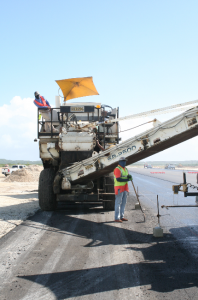
The crew delivers material to the paver in such a way that they keep heavy equipment off the tack coat at the South Caicos International Airport.
Despite being a far cry from what could be considered a “major” airport, South Caicos’ specs were, nevertheless, tight. Eddy said that a standard Superpave mix was used for the runway and tolerances were as tight as .06.
“Superpave has proven itself as a good mix design for minimizing rutting and cracking, and the EX120 has handled the mix well,” he said. “Aggregate sizes for us are 5/8-minus, 3/8-minus and a sand product. According to our plant operator, Simon Vasquez, we’ve been getting a consistent 110 TPH out of the plant with no issues whatsoever. He also ran our previous 150-TPH plant, so he has a familiarity with the system and its ease of operation. For the actual paving itself, we first laid down 152 mm (6 inches) of cement-treated base, then covered that with 105 mm (4 inches) of asphalt, placed in two separate lifts. So, in essence the new structure will have a thickness of 10 inches to handle the anticipated load.”
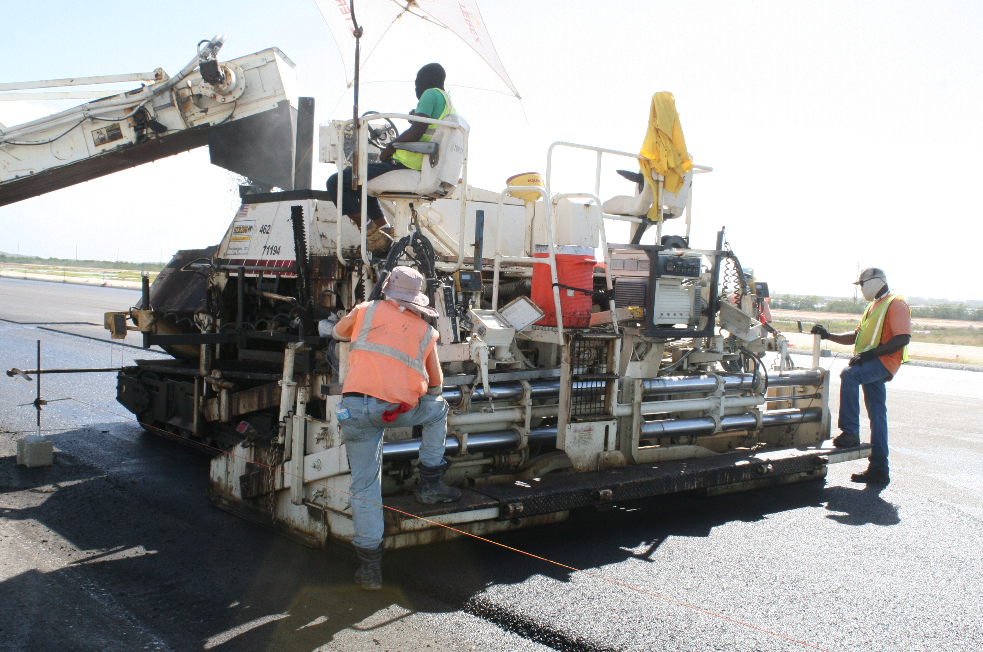
The South Caicos airport job is the latest example of Herzog Caribbean’s general contracting.
Herzog Caribbean Plans for the Long Haul
Even though Herzog Caribbean doesn’t have an overabundance of milled asphalt available to them on South Caicos, they still ordered their EX120 with a capability for producing RAP. Eddy said they did so with an eye toward the future.
“Because of our relatively remote location, one of the biggest expenses we are incurring on this project is liquid asphalt,” he said. “In order to get to us, liquid asphalt has to first be loaded into 20-ton containers in Florida, sent to Ft. Lauderdale, and put on a ship to Provo. From there it gets loaded onto a barge and delivered to us here in South Caicos. It’s a long, involved process that culminates with us getting the cold and having to use heaters to raise the temperature before transferring it to our larger permanent storage tank. So RAP would be a perfect solution were it not for the fact that there is very little seasonal road maintenance in the Caribbean to provide milled material for recycling. But we wanted to have that capability, should things change or we move the plant to an area that does have material to be recycled.”
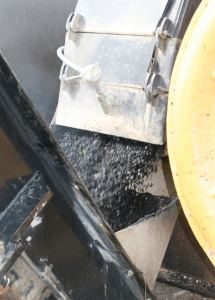
Herzon Caribbean chose to bypass one additional facet of the typical compact plant’s design, one which replaces the silo with a small slat conveyor feeding a five-ton hopper.
That remoteness mentioned above by Eddy, was a definite consideration during the purchase process. In a location like South Caicos, downtime—even if it’s caused by a minor issue—can be devastating, according to Courtney Crush, Herzog Caribbean’s project manager.
“Here in South Caicos, you literally can’t buy a ½-inch bolt,” she said. “Everything has to be shipped, either from the states or, in a best case scenario, from a smaller parts supply store in Provo that might be able to get you something in a couple days. So a steady, reliable performance from the asphalt plant is key, and Michael’s satisfaction with previous ADM plants Herzog has owned obviously came into play.”
The South Caicos airport runway project is slated for an April 2017 completion.
